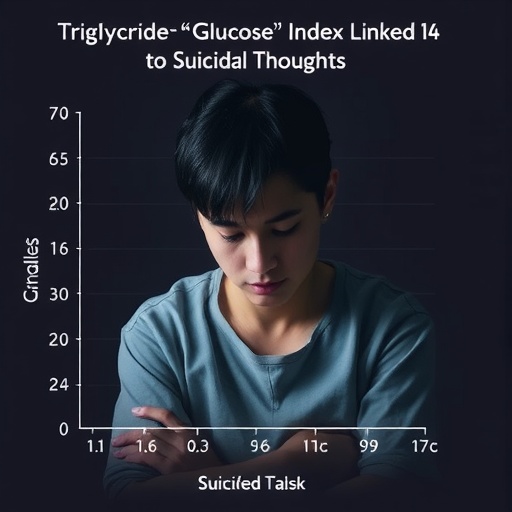In a groundbreaking study, researchers have unveiled a crucial link between the triglyceride-glucose index and suicidal ideation among U.S. adults. The findings, published in the journal Discover Mental Health, stem from a comprehensive cross-sectional analysis of data derived from the National Health and Nutrition Examination Survey (NHANES), a vital resource for understanding public health trends in the United States. This study sheds light on the intricate relationships between metabolic health and mental well-being, emphasizing the significance of metabolic indicators in assessing psychiatric health risks.
At the forefront of this research are Dr. J. Li, Dr. Y. Guo, and Dr. X. Xiao, who collaborated to scrutinize the relevance of the triglyceride-glucose (TyG) index—a composite measure combining triglyceride and glucose levels—as a potential risk factor for suicidal thoughts. Their investigation is pivotal, particularly since mental health issues, including suicidal ideation, have escalated in prevalence over recent decades. Given the importance of elucidating underlying causes of such thoughts, this research stands as a beacon for future interventions and preventive strategies.
The TyG index has emerged as a novel biomarker for insulin resistance, critical to understanding various health conditions, including type 2 diabetes and cardiovascular diseases. However, its connection to mental health issues has remained largely unexplored. By examining a representative sample of U.S. adults, the authors aimed to fill this significant gap in research, thus opening new avenues in both mental health and metabolic syndrome studies.
Through meticulous analysis, Li and colleagues discovered a striking correlation between elevated TyG index scores and increased incidences of suicidal ideation. Their statistical models accounted for various confounding factors like age, gender, body mass index, and existing mental health disorders, reinforcing the robustness of their findings. This methodological rigor not only enhances the credibility of their results but also provides a paradigm for future research aiming to explore the intertwining of mental and physical health.
One of the most compelling aspects of this study is its implications for public health policy. The authors argue that recognizing the TyG index as a potential marker for mental health risk can shift how health practitioners screen for and approach suicidal ideation. This insight suggests that healthcare providers should consider metabolic health as a critical component of mental health evaluations, paving the way for integrated treatment plans that address the full spectrum of an individual’s health.
Moreover, the findings underline the necessity of educating both the public and healthcare professionals about the importance of metabolic factors in mental health. Increasing awareness could lead to proactive interventions, thereby reducing the stigma associated with mental health issues. Patients diagnosed with higher TyG index scores could be prompted to receive tailored counseling, lifestyle modifications, or medical therapies that simultaneously address their physical and mental health needs.
Attention to metabolic health is particularly urgent given the increasing incidence of obesity and related disorders in the U.S. and globally. As the authors rightly point out, the involvement of metabolic health indicators like the TyG index in mental health is an emerging field that necessitates urgent research pursuits. Such inquiries can bolster the existing frameworks of intervention and support services dedicated to addressing mental health challenges.
In conclusion, the integration of metabolic health indicators into mental health assessments marks a transformative step towards holistic healthcare. This research not only highlights the relevance of the TyG index but also sets a precedent for further investigation into the multifaceted relationships between physical health and mental well-being. As the societal burden of mental health issues continues to mount, studies like this underline the importance of interdisciplinary approaches that bridge gaps between different spheres of health.
In light of these findings, future studies should expand on the mechanisms underlying the connection between metabolic dysregulation and mental health. Are these relationships causal, and if so, what biological processes are involved? As researchers delve deeper, they may uncover pathways that not only clarify why changes in metabolic health influence mental well-being but also reveal new targets for therapeutic interventions.
In summary, Li, Guo, and Xiao’s research on the triglyceride-glucose index presents a compelling case for reevaluating mental health assessments and interventions. By considering metabolic health as a vital component of mental well-being, healthcare providers can innovate new strategies that address the comprehensive needs of their patients, potentially leading to better outcomes in the fight against mental health crises. The exploration of this intersection represents a frontier in both medical research and practice, promising to make a significant impact on future health paradigms.
Subject of Research:
Association between the triglyceride-glucose index and suicidal ideation among U.S. adults.
Article Title:
Association between the triglyceride-glucose index and suicidal ideation among U.S. adults: a cross-sectional analysis of NHANES data.
Article References:
Li, J., Guo, Y., Xiao, X. et al. Association between the triglyceride-glucose index and suicidal ideation among U.S. adults: a cross-sectional analysis of NHANES data. Discov Ment Health 5, 155 (2025). https://doi.org/10.1007/s44192-025-00281-8
Image Credits:
AI Generated
DOI:
https://doi.org/10.1007/s44192-025-00281-8
Keywords:
Triglyceride-glucose index, suicidal ideation, mental health, NHANES, metabolic health, public health policy.




